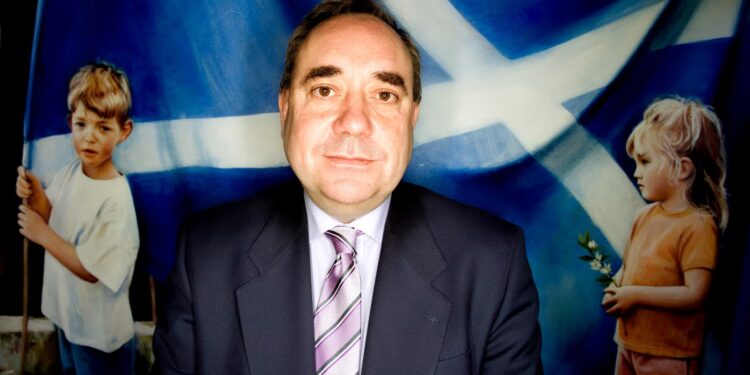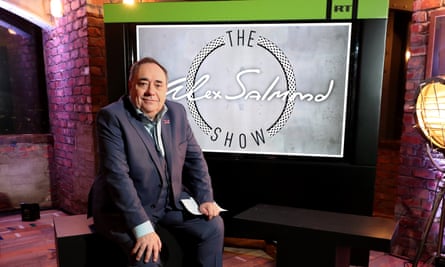The former first minister established the party as a political force but questions later emerged about the influence he wielded
Alex Salmond cemented his place in British political history in May 2011 when he and the Scottish National party did something extraordinary.
They won an overall majority at Holyrood, under a proportional system designed to promote coalitions, not one party’s domination. With the SNP winning 69 of Holyrood’s 129 seats, the result delivered two things that defined Salmond’s legacy.
It established the SNP as a formidable political force, forged largely by what John Swinney described on Sunday as Salmond’s “absolute determination” to win. And second, it established that a referendum on Scottish independence was inevitable.
Yet questions later emerged about the side-effects of the power Salmond was allowed to accrue inside the party and the Scottish government.
Did it prevent some of Salmond’s colleagues from either seeing or acting on disturbing evidence about his personal conduct, actions that later led to his trial for sexual assaults, and the bitter feud with Nicola Sturgeon that defined his later years?
Within months of the 2011 election, the then Conservative-Liberal Democrat coalition government led by David Cameron quickly agreed to Salmond’s demands for a referendum. At the time support for independence hovered at about 32%; Cameron and his close allies were confident of victory and on 19 September 2014, the no campaign won by 55% to 45%.
Salmond quit, paving the way for Sturgeon to be anointed SNP leader unopposed. But in that defeat Salmond had succeeded in normalising independence as a popular position, thanks to the depth and quality of his partnership with Sturgeon. She drew in younger, leftwing urban voters, complementing his appeal to rural, suburban middle Scotland.
Support for independence has hovered since then at about 45% to 50%. The yes vote is now the settled will of a majority of younger voters.
It also set the SNP up to become one of the most dominant political forces in recent British political history. Until July this year, the SNP had not lost an election in Scotland since its first narrow victory in 2007.
Buoyed by the remarkable surge in SNP support that sprung out of the referendum defeat, when the party’s membership soared to 120,000, the SNP won an extraordinary landslide election in 2015, taking 56 of Scotland’s 59 Westminster seats on 50% of the vote.
Yet that proved, in retrospect, to be Sturgeon’s high point. The EU referendum in 2016, when Scotland voted to remain yet was expected to acquiesce to Brexit because of England’s vote to leave, briefly turbocharged support for independence.
Her attempts to leverage a second independence referendum from Brexit backfired in the 2017 general election. Voters were alienated by her rhetoric, and the SNP lost a host of seats – including Salmond’s. He had never lost a parliamentary contest before, and he lashed out.
To Sturgeon’s frustration, Salmond ignored advice from his closest aides to choose a dignified exit by setting up a foundation or taking his pick of international roles. Instead he launched a chat show on the Kremlin-funded television channel RT.
In August 2018, the news broke that Salmond had been investigated by Scottish government officials for alleged misconduct towards female civil servants. Although the findings were later set aside by a court for procedural failings, including apparent bias, that internal inquiry had upheld five complaints from two women.
In March 2020, Salmond was prosecuted on 13 charges of sexual assault, including sexual assault with intent to rape. He was acquitted of every charge yet the trial heard some complaints were dealt with quietly by some of Salmond’s officials; some complainers admitted they downplayed their experiences at the time to avoid undermining Salmond’s independence campaign.
Even his lawyer described Salmond’s “touchy-feely” behaviour as “inappropriate”. One confidante suggests he remained unwilling to reflect on his own part in this, and still believed strongly the charges were the result of a conspiracy.
By then Holyrood had launched its investigation into the government’s mishandling of the internal review, entrenching a now open feud with Sturgeon.
In spring 2021, Salmond’s popularity had plummeted: open polls showed as few as 8% of voters were favourable towards him; as many as 75% disliked him. Sturgeon’s popularity had soared, particularly during the first year of the Covid crisis.
Salmond had quit the SNP in fury, setting up a rival party, Alba. It became an outlet for a handful of SNP politicians and those activists irritated by Sturgeon’s progressive, identity-focused policies, and her alliance with the Scottish Greens.
With Salmond’s unexpected death, Alba is unlikely to survive as a political force. Its sole MSP, Ash Regan, is unlikely to win a seat at the next Holyrood election; in the July general election Alba won just 0.5% of the national vote.
Salmond’s death also raises a more subtle and significant question for the wider nationalist movement. With Sturgeon now a largely inactive backbencher who may not stand again for Holyrood, Swinney is the only established nationalist leader left.
There are a handful of possible candidates in the younger generation – Swinney’s deputy, Kate Forbes, and the party’s Westminster leader, Stephen Flynn, are mentioned most often, but until the next Holyrood election in 2026, Swinney will be the last veteran standing.
Source: The Guardian



Recent Comments